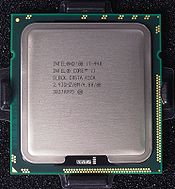Intel Core i7
 | |
| Produced | From 2008 |
|---|---|
| Common manufacturer(s) | |
| Max. CPU clock rate | 1.3 GHz to 4.2 GHz |
| QPI speeds | 4.8 GT/s to 8 GT/s |
| Min. feature size | 45 nm, 32 nm, 22 nm, 14 nm, 10 nm, and Intel 7 |
| Instruction set | x86, x86-64, MMX, SSE, SSE2, SSE3, SSSE3, SSE4.1, SSE4.2 |
| Microarchitecture | Nehalem Sandy Bridge Sandy Bridge-E Ivy Bridge Ivy Bridge-E Haswell Haswell-E Broadwell Skylake Comet Lake Rocket Lake Alder Lake Raptor Lake |
| Number of cores | 2, 4, 6, 8, 10 , or 16 |
| Socket(s) |
|
| Core name(s) |
|
Intel Core i7 is a name that the company Intel uses for the computer processors it makes for high-end desktop and laptop computers and tablets. Intel uses this name for the fastest processors that they think will be used to build the most powerful consumer devices. The 'Core' part of the name, which refers to the processor's core, has been used by Intel since 2006, but the first Core i7 processor was released 3 years later in 2009.
There are different types of Core i7 processor. The name does not name a type. Instead, it is the name for all of the fast processors that Intel thinks should be sold to consumers. Intel uses two other "Core i-" names for its processors for consumers: "Core i5" and "Core i3." The "Core i5" processors are mostly as fast as i7 processors, but lack the Hyper Threading technology which allows each core to be used twice simultaneously giving the impression of doubling the cores.
Intel uses a different name, Xeon, for processors that Intel makes for "server" computers for businesses (and some rare laptops). Some of the "Core i7" processors are almost the same as some of the "Xeon" processors, but each of the Xeon processors is a little bit different than the "Core i7" processor, because a "server" computer is not the same as a consumer computer. Intel also makes other "Xeon" processors that are not the same as any "Core i7" processor. Unlike the Core i7, Xeon processors support ECC (error correcting) memory, and multiple CPUs on the same motherboard. However, Alder Lake processors have officially supported ECC memory if used with a W680 motherboard and ECC memory.
References